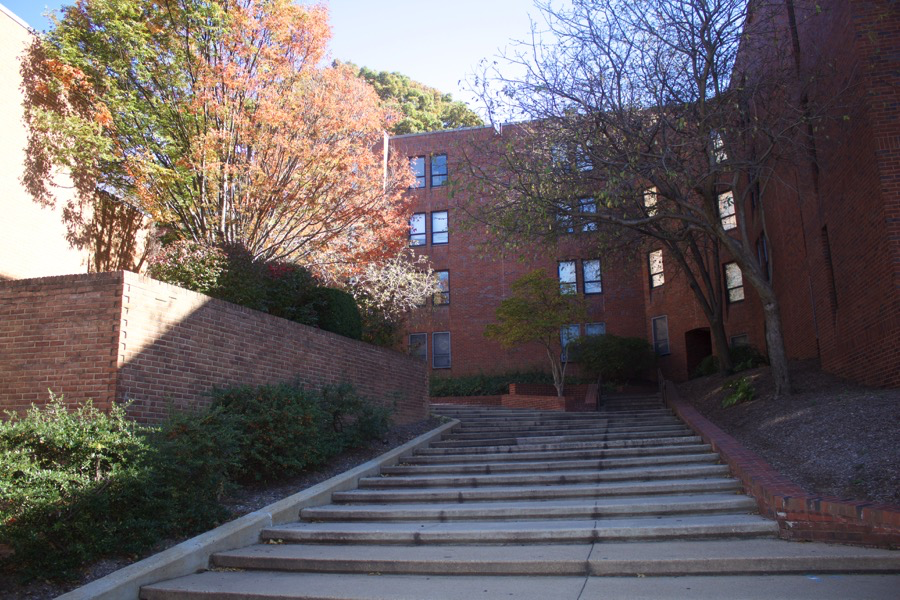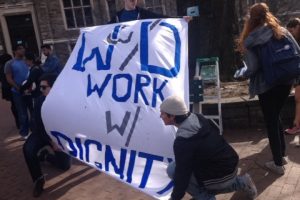When Andrew Adams (NHS ’20) and Chad Gasman (COL ’20) graduated Georgetown this spring, they left behind a movement that never fully came to fruition.
The pair helped lead the push for residential assistants (RAs) to unionize beginning in the fall of 2018. A much-rumored but never fully public campaign started with a belief that RAs were given insufficient meal plans, reached a height of nearly going public and calling for a vote to form the union, and slowly tapered off over the past academic year. As two of the RAs most closely involved with the union effort leave campus, they say the need for a union hasn’t decreased—but they aren’t sure who will continue the push for it.
Georgetown’s history with labor is a complicated one. While many groups of workers on campus, including janitorial staff, food service workers, and adjunct professors have unions, the university’s response to unionization efforts has been heavily criticized. Most recently, the Georgetown Alliance of Graduate Employees (GAGE) voted to unionize in September of 2018. Since then, members of GAGE expressed frustration over a year-long fight to secure a contract, which was finally ratified on May 8 of this year in a historic victory for graduate student unions. More recent collective bargaining meetings, however, have left GAGE members feeling unheard.
RA unions, though they have been the subject of campus newspaper editorials for almost two decades, are still fairly rare across the country. This is unsurprising—RAs are only in their position for a maximum of three years, presenting a challenge to long-term organizing, and face public opposition from universities.
Attempted RA unions at Georgetown’s neighboring universities have been unsuccessful in the past. In 2017, the National Labor Relations Board (NLRB) ruled RAs at nearby George Washington University had the right to unionize. GW’s official article on the decision included university statements opposing the formation of a union. Following the cancellation of a unionization vote by the local union who was slated to represent GW RAs, the university updated the RA agreement so the student workers were no longer referred to as employees. RAs saw the change as a tactic to stifle future unionization efforts.
To Adams, the core argument for RA unionization is simple.
“The university would not function without RAs. They try to sell the position as just a leadership position but you’re a worker and you deserve the same thing that workers deserve,” Adams said.
The movement for an RA union at Georgetown began in the fall of 2018, Adams said, when RAs began to come together in response to what they saw as insufficient meal plans.
“Basically, what really started it was food,” Adams explained. In 2018, the meal plan for RAs provided them about eight meals a week, far under the 21 required to eat three meals a day. RAs are compensated only through housing, meal plans, and Flex dollars, and did not receive additional funds to make up the dozen meals their meal plan did not cover.
“It was not enough, that’s the point. The point was that it was inadequate,” Adams said. He and Gasman began reaching out to other RAs and the RA Council, which is meant to handle concerns of RAs, but reported they had little success and were told an increased meal plan would be impossible due to university funding.
At the same time, these conversations were happening, the GAGE unionization effort was ramping up on campus. Based on conversations with GAGE members, union representatives, and the continued non-response from the university, Adams said a group of RAs decided a union was the best way forward.
In order to form a union, a group of workers, in this case, Georgetown RAs, must first identify a union to represent them. They then have to send proof to the NLRB, either through petitions or union cards that 30 percent of the body of workers support a unionization election, and then win said election with the support of over half the members of the potential union. Following the election, the new union can begin bargaining for their first contract with their employer.
Georgetown RAs chose the American Federation of Teachers (which also represents GAGE) to represent them and reached out to almost all members of the potential union. According to Adams, 70 percent of RAs signed on to their mission statement, and a third were on union cards—enough to call an election.
While some RAs resisted the idea of unionization, Gasman said they were few and were often those who would not have benefited greatly from increased meals and benefits.
“Their response was for the most part that they were personally okay with what was happening and they weren’t facing the brunt of the problem,” they said. “A lot of the people who were against the union, I would assume, didn’t face the same food insecurity problem other RAs were facing.”
Another factor influencing the decision of some RAs was the risk of losing their job. RAs are at-will employees, meaning they can be fired at any point without much warning. Current RAs also have to reapply for the following year and have previously reported feeling edged out following a conflict with the university by being placed in residence halls they were uncomfortable with. Gasman mentioned one RA was told by their community director, who supervises the RAs in a residential hall, that they shouldn’t unionize.
“To be sure it was a risk,” Adams said, recognizing many RAs depend on the position to afford housing and food. “There was a high reward that was available, but it was a risk and many people shied away from the idea of unionizing because they were nothing more than just scared.”
Despite these challenges, by the spring of 2019, the group was almost ready to start organizing more publicly, planning to reach fifty percent RA support before they called for an election. This was kicked off with an email from organizers to all RAs outlining their numbers, their demands, the reasons behind unionization, and the plan going forward.
“The next day [the university] responded with the improved meal plan,” Gasman said.
Though Gasman and Adams can’t say for sure how much the university knew at any point, they suspect their email was forwarded to someone in Residential Living, since just 24 hours later, the next crop of RAs were promised full room and board, including adequate meals, and $1,000 more in Flex dollars. Current RAs were also given additional Flex dollars.
“We can’t know for sure if the improved meal plan was a result of them knowing about the union and our organizing but we are fairly sure the only reason they improved the meal plan in the past year was because we tried to unionize the year before,” Gasman said.
While many RAs were content with the announcement and the increased meals, Adams said, organizers like he and Gasman saw it as an attempt to stop their efforts.
“We knew this was the university trying to soft union bust. They were being the good guys, they kind of, they knew that meals were our biggest thing,” Adams said. “And so they gave us that, and it kind of deflated the momentum we had going.”
According to a university spokesperson, Georgetown made the decision as part of an effort to stay on par with peer institutions. “At the end of 2018, Georgetown began looking at meal plan options for the upcoming 2019 – 2020 year with the goal of making improvements. We announced an improved meal plan during the RA selection and acceptance process for the 2019-20 academic year,” the spokesperson wrote in an email to the Voice.
The team continued to organize, hoping to reach the threshold of fifty percent with union cards so they could be confident in winning a union election. With the meal issue resolved, they turned to other long-standing complaints, including leadership and accountability in Residential Living, and the fact the RAs do not receive monetary compensation in the form of wages or a stipend (GW RAs receive a yearly stipend of $2,500).
Additional demands included reimbursement for position-associated costs, the option for semester contracts to allow RAs to study abroad, mental health support and resources, and a secure contract.
“The fact that we are at-will employees is a big one,” Gasman said. “RA contracts can be terminated by the community director and res living at any point without much warning, and that often resulted in RAs losing their housing and food security for the semester for what often was, what we would consider, bullshit.”
The issue of at-will employment resurfaced recently when Georgetown suspended the RA position for the coming year just a week before RAs were supposed to move into campus as part of their updated Fall 2020 plan, leaving many RAs scrambling for housing as the semester loomed.
“[At-will employment] is exactly how they were able to fire RAs right before the start of the school year. That’s the only reason they were able to get away with that,” Adams said.
Though these concerns, among many, remained, the momentum the pair had built up did not. While RAs still supported unionization this fall, and even some who hadn’t been on board the previous year signed on, according to Adams, job searches, school work, and finally the COVID-19 pandemic made it difficult to keep organizing.
“Any momentum that was left was gone,” Adams said of the movement post-March.
This may not be the first time a push for RA unionization petered out. According to Gasman, RAs have asked for improved conditions before and it seems likely unionization was part of those efforts. However, potential unions generally do not go fully public until they are ready to call for an election and feel confident their employer can’t dissuade their support.
“You don’t ask for an election unless you’re ready to win it,” Adams said.
This most recent push, then, may have been the farthest a cohort of RAs ever got. Adams said it would be possible to get there again, but it’s difficult.
“They would need someone who knows how close we got,” he said, adding that the experience might not be necessary, but would help in the early stages of organizing.
Georgetown RAs were aware of both the immense challenges in their path and the possibly historic nature of their campaign if they were to succeed, Adams said. “We almost did it, we came really close, and not just for Georgetown but we would be one of the first RA unions in the country.”
The labor movement is taking some steps forward at the university. The new GAGE contract is a step forward for university workers looking to unionize—but Gasman warned against taking it as a sign Georgetown is more inclined to work with labor. At the time of publication, GAGE is fighting for what they see as necessary COVID-19 protection from the university, including remote teaching options.
“The past week with GAGE has shown me how little Georgetown cares about labor,” Gasman said, referencing the ongoing negotiations. “It’s clear that the university is scared of the power of its workers coming together because the university in every single way tries to exploit and abuse its workers.”
In response to concerns about the treatment of RAs, the university spokesperson said the university is committed to engaging with RAs. “Georgetown deeply values the Resident Assistant (RA) position, one of the University’s most highly desired and impactful leadership opportunities,” they wrote. “We look forward to working with RAs when public health conditions allow for the return of more students to campus. We will continue to engage with Resident Assistants to ensure they have a positive experience.”
Adams doesn’t want the perceived lack of care to prevent RAs from working to improve their job. He listed the wide variety of tasks that fall on RAs’ plates—responding to crises, including mental health concerns and incidents of sexual assault, solving problems, welcoming students. To him, RAs are an essential part of Georgetown but aren’t compensated as such.
“You feel a little tricked into thinking that because you are receiving housing and food that’s all you deserve and that could not be further from the truth,” Adams said.
Getting what RAs feel they deserve was the crux of the unionization effort, Gasman said. To them, there’s no other option.
“I don’t think that anything short of a union will get RAs to have better working conditions at a school like Georgetown.”
This post has been updated to include the date of the ratification of GAGE’s agreement.





